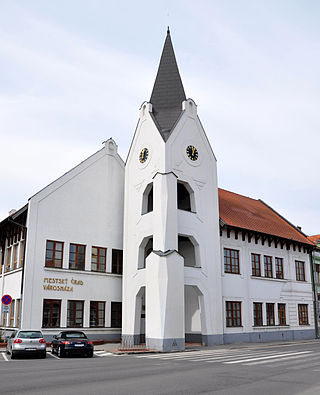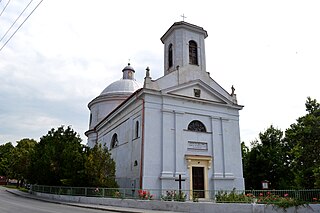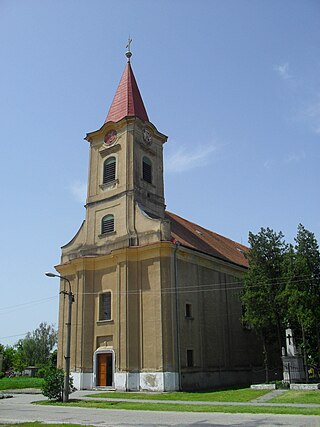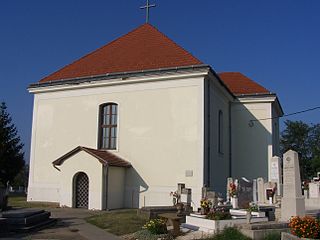
Debrecen is Hungary's second-largest city, after Budapest, the regional centre of the Northern Great Plain region and the seat of Hajdú-Bihar County. A city with county rights, it was the largest Hungarian city in the 18th century and it is one of the Hungarian people's most important cultural centres. Debrecen was also the capital city of Hungary during the revolution in 1848–1849. During the revolution, the dethronement of the Habsburg dynasty was declared in the Reformed Great Church. The city also served as the capital of Hungary by the end of World War II in 1944–1945. It is home to the University of Debrecen.

Lajos Kossuth de Udvard et Kossuthfalva was a Hungarian nobleman, lawyer, journalist, politician, statesman and governor-president of the Kingdom of Hungary during the revolution of 1848–1849.

Balatonfüred is a resort town in Veszprém county, in Hungary. The town with a population of 13,000 is situated on the northern shore of Lake Balaton. It is considered to be the capital of the Northern lake shore and is a yachting destination. It is also a location for fishing although the introduction of eels and other non-indigenous species has caused ecological damage in recent years.

Nyíregyháza is a city with county rights in northeastern Hungary and the county capital of Szabolcs-Szatmár-Bereg. With a population of 118,001, it is the seventh-largest city in Hungary and the second largest in the Northern Great Plain region. Its development has been ongoing since the 18th century, making it the economic and cultural center of the region. Nyíregyháza Zoo, with over 500 species, is recognized throughout Europe.

Sátoraljaújhely is a border town located in Borsod-Abaúj-Zemplén County, Hungary. It serves as the center of the Sátoraljaújhely District and microregion. The town is renowned for its wine region and, since 2002, has been part of the Tokaj-Hegyalja Historic Wine Region Cultural Landscape, a UNESCO World Heritage site. Sátoraljaújhely is often referred to as the "Capital of Zemplén" due to its history as the former seat of Zemplén County and as the largest settlement in the Hegyalja region. The town was split by the new border established by the Treaty of Trianon, with the ceded suburb now located in Slovakia, known as Slovenské Nové Mesto.

Bardejov is a town in North-Eastern Slovakia. It is situated in the Šariš region on a floodplain terrace of the Topľa River, in the hills of the Beskyd Mountains. It exhibits numerous cultural monuments in its completely intact medieval town center. The town is one of UNESCO's World Heritage Sites and currently maintains a population of about 32,000 inhabitants.

Cegléd is a city in Pest county, Hungary, approximately 70 km (43 mi) southeast of the Hungarian capital, Budapest.

Dunajská Streda is a town located in southern Slovakia. Dunajská Streda is the most culturally significant town in the Žitný ostrov area. The town has a population of 22,730, with ethnic Hungarians forming the 72% majority.

Szeghalom is a town in Békés county, in southeastern Hungary.

Csurgó is a town in Somogy County, Hungary, and the seat of Csurgó District.

Soltvadkert is a town in Bács-Kiskun County in Hungary with approximately 8,000 inhabitants. The former name of the town is Vadkert. It is surrounded by several areas of Kiskunság National Park and Lake Vadkert.

Sărmășag is a commune in Sălaj County, Crișana, Romania.

Čataj is a village and municipality in western Slovakia in Senec District in the Bratislava region. This typical agricultural village has fewer than 1000 inhabitants and is located aside from major roads, roughly between Senec and Trnava.

Iža is a village in south-western Slovakia.

The Hungarian Revolution of 1848, also known in Hungary as Hungarian Revolution and War of Independence of 1848–1849 was one of many European Revolutions of 1848 and was closely linked to other revolutions of 1848 in the Habsburg areas. Although the revolution failed, it is one of the most significant events in Hungary's modern history, forming the cornerstone of modern Hungarian national identity—the anniversary of the Revolution's outbreak, 15 March, is one of Hungary's three national holidays.

Mihăileni is a commune in Harghita County, Romania. The commune lies in the Székely Land, an ethno-cultural region in eastern Transylvania. It is composed of four villages: Livezi (Lóvész), Mihăileni, Nădejdea (Ajnád), and Văcărești (Vacsárcsi).

Abony is a town in Pest County, Hungary.

Kőröshegy is a village directly south of Balatonföldvár in Siófok District, Somogy County, Hungary.

Maglód is a town in Pest County, Budapest metropolitan area, Hungary.

Dabas is a district in southern part of Pest County. Dabas is also the name of the town where the district seat is found. The district is located in the Central Hungary Statistical Region.
























